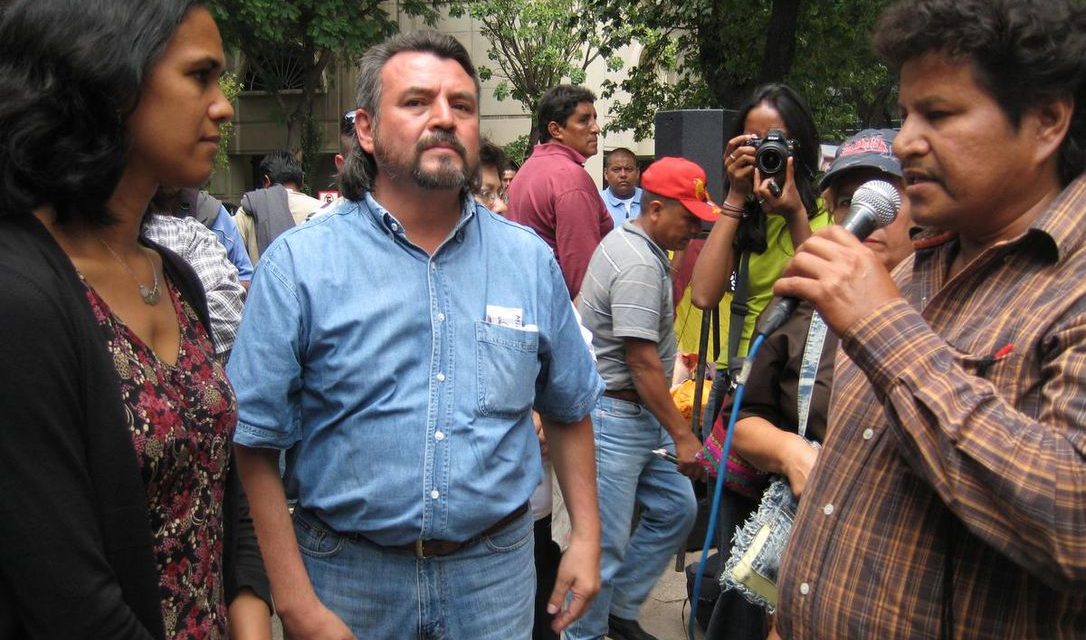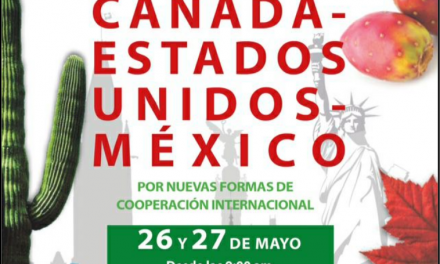The assassination of Mexican activist Mariano Abarca stands little chance of gaining the spotlight in Ottawa given all the tumult in the nation’s capital. But Monday’s judicial review before Federal Court Justice Keith Boswell deserves attention, reminding us of the tragic events of a decade ago and the present day oversight, or lack thereof, of Canadian mining companies operating abroad.
There’s no disputing the fundamental facts. Abarca had assumed a primary role in protesting Blackfire Exploration’s open-pit barite mine in the southern state of Chiapas. The U.S. Geological Survey’s minerals yearbook for 2008 noted that the Canadian junior mining company planned to extend its operations underground, with the company trumpeting the La Revancha mine as the largest high-grade barite deposit in North America. In other words, Blackfire saw a long, bright mining future in Mexico ahead of it.
Antimining leader Mariano Abarca (holding microphone) was killed in a drive-by shooting and Canadian lawyer, Shin Imai, will argue that the integrity commissioner should have investigated the events around Abarca’s murder.
Opposition to the mine was led by two groups, one of which, the Mexican Network of People Affected by Mining, was led by Abarca, speaking out against the environmental impacts of the mine and the failure to acknowledge the rights of Indigenous groups. Protests against the mine included a months-long blockade of its operations. Abarca, along with two members of his family, was beaten at his home in the summer of 2008. The following summer he led a protest delegation to the Canadian Embassy in Mexico City. He was later detained by police following a complaint by Blackfire. In November 2009, he lodged his own complaint against the mining company, alleging that death threats had been made against him by Blackfire employees. Days later he was murdered — a drive-by shooting outside his home.
In December 2009, the mine was shut down over environmental concerns, including toxic emissions, the redirection of water sources and the unpermitted change of land usage. Blackfire, which consistently denied any involvement, has since dissolved.
The issue that will be heard by Justice Boswell on Monday could have far-reaching implications for the mining industry.
In quieter political times, it would shine a light on the persistent failure of Canadian governments to effect a robust system of investigation of, and compliance by, the extractive industries.
And it comes at a moment when the still-new Mexican government of Andrés Manuel Lopez Obrador has put the international mining community on notice that there will be more robust oversight of foreign mining companies.
The review stems from a submission made more than a year ago to Canada’s public sector integrity commissioner by the Justice and Accountability Project, which provides legal assistance to Indigenous communities negatively affected by resource extraction. The project’s co-lead is Shin Imai, law professor at Osgoode Hall Law School at York University.
In February 2018, Imai requested that the integrity commissioner investigate the events around Abarca’s murder. That seems an odd leap. What would the integrity commissioner have to say about a murder in a far off land?
It is this: “What we can determine” — I am quoting from Imai’s text — “is that the Canadian Embassy acted in ways that appear to be contrary to government policies at that time, and may have resulted in two types of wrongdoing that should be investigated. The first issue relates to the Canadian Embassy’s failure to follow three policies relating to conflicts between local Mexican communities and Canadian mining companies. The Canadian Embassy ignored warnings that Mr. Abarca’s life and safety were in danger, while actively advocating on the company’s behalf with the government of the State of Chiapas. The second issue is whether the Canadian Embassy knew about, but did not report, suspicious payments made by the mining company into the personal bank account of a local politician.”
The legal framework for the alleged wrongdoing is the Public Servants Disclosure Protection Act. The policies that are alleged to have been breached include a failure to adhere to corporate social responsibility guidelines established when Stephen Harper’s Conservatives were in power.
A deep trove of diplomatic emails and briefings — more than 900 pages of documents obtained through Access to Information by MiningWatch Canada — were first reported on by the Star and La Presse in 2013. That report included emails from a Blackfire executive to the embassy in September 2008, thanking officials for everything “that the embassy has done to pressure the state government to get things going for us. We could not do it without your help.”
Last April, commissioner Joe Friday found that it was not in the public’s interest to commence an investigation and concluded that the “policies” were not official Government of Canada policies. It is that decision that Shin Imai will be arguing against before Justice Boswell on Monday.
“The Canadian embassy did act, in my view, in an egregious manner,” says Imai in an interview, adding that the Abarca family continues to carry on the fight “because they saw what happened to their father and they think it’s very important for the Canadian embassy to come under scrutiny and make sure it doesn’t happen again.”
Abarca’s brother and his son plan to attend Monday’s proceedings.
The case could boil down to this: is it the role of an embassy to be a corporate advocate or is it to uphold fundamental human rights and facilitate dialogue?
The current Liberal government has promised a whole new governance model for extractive industries, including an ombudsman with investigative and enforcement powers to replace the ineffective corporate social responsibility counsellor, whose mandate ended 10 months ago. We’re still waiting on that.





